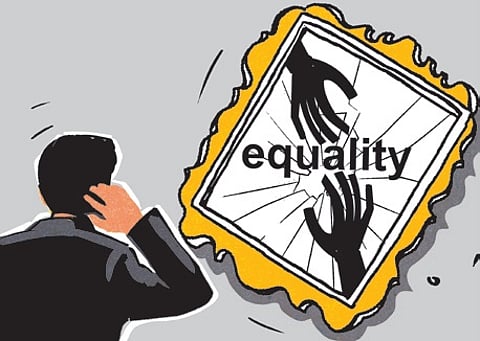

Karl Marx famously disparaged religion as “the opium of the masses”. Though my German is even poorer than my Hindi, I take it that Marx felt religion was a clever tool wielded by the powerful to not only oppress the overworked and underpaid majority but to make them feel better about their oppression by encouraging them to fixate on faith-based fixes since they couldn’t afford opiates and float their way out of poverty and pain on a pleasurable cloud of oblivion.
Since Marx’s time, politicians and their billionaire backers have come up with many innovations to further subjugate the suppressed with liquor guaranteed to end suffering via cirrhosis of the liver, freebies and pornography to delight the heart and loins, and cheap entertainment accessible 24/7 on mobile phones. Religion, however, remains the favourite with the ridiculously and rabidly religious rapidly becoming a plague on an already diseased civilised world.
Ironically, though the core doctrine of most religions endorses love, peace and compassion, the revival of faith-based conflict and violence witnessed in recent times has seen religion commonly associated with hate, intolerance and heightened aggression. Even as the situation worsens in Gaza and people across the world are slamming Israel and its allies as perpetrators and enablers of genocide, the slaughter of the Islamist population in that contested strip of ‘holy land’ continues unabated.
Religious fanaticism has raised its ugly head elsewhere too. In China, Uighur Muslims are routinely persecuted and herded into labour camps, as are the Rohingya in Myanmar. In the middle East, Sunni and Shia Muslims battle it out for domination as do the Muslims and Catholics in Bosnia and Kosovo. Islamic extremists wage their global jihad undeterred by concentrated efforts to shut them down. Hostilities have increased against religious minorities be they Hindus, Muslims, Jews, Buddhists or and Catholics in many parts of the world. Closer home, in India the ruling party has been accused of actively promoting Hindu and Hindi interests to the detriment of all else.
To be fair, religion and the religious leaders who are not actively invoking violence in the name of faith have done some good in this divided world. The devotees who have not become radicalised or taken up terrorism have actively involved themselves with helping the poor, marginalised and victims of war. Relief and charitable efforts have been made possible through the efforts of the faithful mobilised by temples, churches, mosques, synagogues working in tandem with humanitarian agencies and welfare organisations. Interfaith dialogues have also facilitated initiatives to promote peace, human rights and non-violence.
Even so, if the security blanket of religion is taken away it is possible that people wouldn’t be so preoccupied with the futile effort to secure a ticket to paradise using the currency of blind faith, prayer and ritual worship. Without the highs and lows of religious relief they may be forced out of their collective torpor to address the widening wealth gap and income inequality that impacts them directly. Combined effort might even create a better world where all are equal and there is absolutely no need for a toxic drug like religion.
Anuja Chandramouli
Author and new age classicist
anujamouli@gmail.com